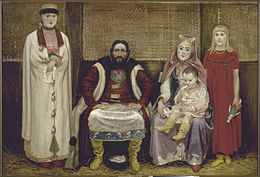- Domostroy
-
Domostroy or Domostroi (Russian: Домострой, Domestic Order) is a 16th century Russian set of household rules, instructions and advices pertaining to various religious, social, domestic, and family matters of the Russian society. Core Domostroi values tended to reinforce obedience and submission to God, Tsar and Church. Key obligations were fashion, prayer, icon veneration and the giving of alms.
Contents
Source
Its real author is unknown, but the most widespread version was edited by the archpriest Silvester, an influential advisor to young Ivan IV.[1] The text does include an epistle entitled "64. A Father's Epistle Instructing His Son," which was written by Silvester instructing his son, Anthemius, on some of the larger themes found within the Domostroi. An updated edition of the Domostroi was compiled by Karion Istomin during the late 17th century. To modern researchers, it is a precious account about Russian society and the life of wealthy boyars and merchants.
Modern researchers tend to trace the origins of the Domostroy to the 15th century Novgorod Republic, where it could have been used as a kind of moral codex for the wealthy. As such, it has some quotations from the Book of Proverbs and other biblical texts, and from earlier Russian morale texts such as Izmaragd and Zlatoust, and from some western texts such as Book of Christian teachings (Czech) and Paris landlord (French).
In modern Russia, the term Domostroy has a pejorative meaning. It is used in such classic texts as Herzen's My Past and Thoughts and Turgenev's Fathers and Sons to refer to a traditionalist way of life associated with patriarchal tyranny, as exemplified by the following quotations: A wife which is good, laborious, and silent is a crown to her husband. Don't pity a youngling while beating him: if you punish him with a rod, he will not die, but become healthier.
Structure
The book is divided into 67 sections (in Sil'vestr's version) dealing roughly with the following matters:
- Religious practices
- Relationship between Russian people and the tsar
- Organization of the family
- Management of the household
- Culinary
Themes
- Punishment -
- "38: But if your wife does not live according to this teaching and instruction, does not do all that is recommended here, if she does not teach her servants, then the husband should punish his wife. Beat her when you are alone together; then forgive her and remonstrate with her. But when you beat her, do not do it in hatred, do not lose control. A husband must never get angry with his wife; a wife must live with her husband in love and purity. You should discipline servants and children the same way. Punish them according to the extent of their guilt and the severity of their deed. Lay stripes upon them but, when you have punished them, forgive them."
References
- ^ Carolyn Johnston Pouncey, The Domostroi: Rules for Russian Households in the Time of Ivan the Terrible, p37 ISBN 0-8014-9689-6
- Domostroy, SPb, Science, 1994 (from the presentation of the book)
External links
- Domostroy, Sil'vestr's version (Russian)
Categories:- Muscovite Russia
- Russian books
- 16th-century Christian texts
- 16th-century laws in Christianity
- 16th-century books
Wikimedia Foundation. 2010.


